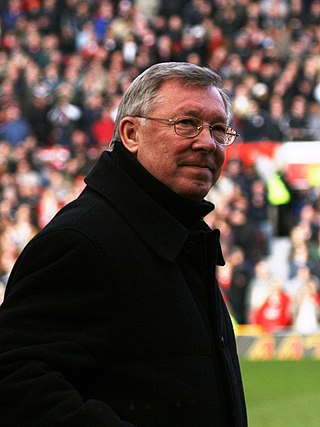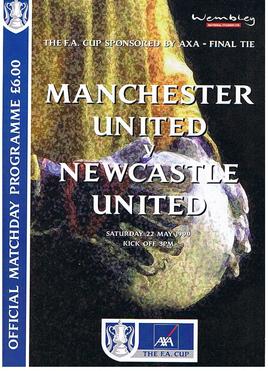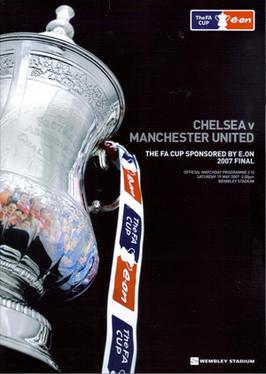
Trevor John Francis was an English footballer who played as a forward for a number of clubs in England, the United States, Italy, Scotland and Australia. In 1979 he became Britain's first £1 million player following his transfer from Birmingham City to Nottingham Forest. He scored the winning goal for Forest in the 1979 European Cup final against Malmö. He won the European Cup again with the club the following year. At international level, he played for England 52 times between 1976 and 1986, scoring 12 goals, and played at the 1982 FIFA World Cup.

Roy Maurice Keane is an Irish football pundit, former coach, and former professional player. He is the joint most successful Irish footballer of all time, having won 19 major trophies in his club career, 17 of which came during his time at English club Manchester United. Regarded as one of the best midfielders of his generation, he was named by Pelé in the FIFA 100 list of the world's greatest living players in 2004.

Ryan Joseph Giggs is a Welsh football coach, former player and co-owner of Salford City. Regarded as one of the greatest players of his generation, Giggs spent his entire professional career at Manchester United, where he also served as the club's interim player-manager and assistant manager. He is one of the most decorated footballers of all time, and is one of only 44 players to have made over 1,000 career appearances.
The 1992–93 FA Premier League was the inaugural season of the Premier League, the top division of English football. The season began on 15 August 1992 and ended on 11 May 1993. The league was made up of the 22 clubs that broke away from The Football League at the end of the 1991–92 season. The new league was backed up by a five-year, £304 million deal with Sky to televise Premier League matches. In concept, the Premier League was identical to the old First Division of the Football League, which was now reduced to three divisions.

Brian John McClair is a Scottish football coach and former professional footballer. As a player, he was a forward from 1980 to 1998, notable for his near 11-year spell at Manchester United where he won 14 trophies including four Premier League titles, two FA Cups and the European Cup Winners' Cup.

The period from 1986, when Alex Ferguson was appointed as Manchester United manager, to 2013, when he announced his retirement from football, was the most successful in the club's history. Ferguson joined the club from Aberdeen on the same day that Ron Atkinson was dismissed, and guided the club to an 11th-place finish in the league. Despite a second-place finish in 1987–88, the club was back in 11th place the following season. Reportedly on the verge of being dismissed, victory over Crystal Palace in the 1990 FA Cup Final replay saved Ferguson's career. The following season, Manchester United claimed their first UEFA Cup Winners' Cup title. That triumph allowed the club to compete in the European Super Cup for the very first time, where United beat European Cup holders Red Star Belgrade 1–0 at Old Trafford. A second consecutive League Cup final appearance in 1992 saw the club win that competition for the first time as well, following a 1–0 win against Nottingham Forest at Wembley Stadium. In 1993, the club won its first league title since 1967, and a year later, for the first time since 1957, it won a second consecutive title – alongside the FA Cup – to complete the first "Double" in the club's history. United then became the first English club to do the Double twice when they won both competitions again in 1995–96, before retaining the league title once more in 1996–97 with a game to spare.

The 1998–99 season was Manchester United's seventh season in the FA Premier League and their 24th consecutive season in the top division of English football. After finishing the previous season without winning any titles, United won the Treble of the Premier League, FA Cup and UEFA Champions League in 1998–99, the first side in English football to do so. During the campaign, United lost only five times: in the Charity Shield against Arsenal; in the fifth round of the League Cup against eventual winners Tottenham Hotspur; and three times in the league, including their only home loss all season, against Middlesbrough in December 1998. A run of 33 games unbeaten in all competitions began on 26 December at home to Nottingham Forest, whom they also beat 8–1 away from home in February 1999, Manchester United's record away win in the Premier League. The season was characterised by comebacks, particularly in the FA Cup fourth round against Liverpool and the semi-finals of the Champions League against Juventus, but none more so than in the Champions League final, when Teddy Sheringham and Ole Gunnar Solskjær scored in injury time to overturn Bayern Munich's early lead.

The 1996 FA Cup final was the 51st to be held at Wembley Stadium after the Second World War and was held between two of the biggest rivals in English football, Manchester United and Liverpool.

The 1999 FA Cup final was an association football match that took place on 22 May 1999 at the old Wembley Stadium in London to determine the winner of the 1998–99 FA Cup. It was contested between Manchester United and Newcastle United. Goals from Teddy Sheringham and Paul Scholes gave Manchester United a 2–0 win to claim their 10th FA Cup title. It was the second part of the treble of trophies Manchester United won during the 1998–99 season, which was completed four days later, when they won the Champions League.

The 2007 FA Cup final was played on Saturday, 19 May 2007 between Chelsea and Manchester United. It was the 126th FA Cup Final and the first to be played at the new Wembley Stadium. Chelsea beat Manchester United 1-0 thanks to an extra-time goal from Didier Drogba, completing a domestic cup double for the Blues in the 2006–07 season, as they had already won the League Cup Final in February. Manchester United were favourite for winning a double of their own as they had recently beaten Chelsea to the Premier League title two weeks earlier. The game was widely considered to be a disappointment by pundits and fans alike. As a result of Manchester United and Chelsea having already been guaranteed qualification for the UEFA Champions League, the UEFA Cup entry for the FA Cup winner/runner-up went instead to the highest positioned Premier League team who had not already qualified for Europe: Bolton Wanderers.

The 1991 European Super Cup was the 16th European Super Cup, an annual football match organised by UEFA and contested by the winners of the previous season's European Cup and Cup Winners' Cup competitions. The match was played on 19 November 1991 and featured the 1990–91 European Cup winners, Red Star Belgrade, and Manchester United, winners of the 1990–91 Cup Winners' Cup. It was meant to be played over two legs, but due to the political unrest in Yugoslavia at the time, UEFA decided that only the leg at Manchester United's home, Old Trafford, would be played.
The 1991 Football League Cup Final was a football match played on 21 April 1991 between Manchester United and Sheffield Wednesday. It was the first of two years that the competition was sponsored by Rumbelows.

The 1991–92 season was Manchester United's 90th season in the Football League, and their 17th season consecutive season in the top division of English football.

Fergie's Fledglings were a group of football players recruited by Manchester United under the management of Sir Alex Ferguson and trained by assistant coaches Brian Kidd and Eric Harrison, before eventually progressing to the first team during the 1990s.
The 1992–93 season was Manchester United's first season in the newly formed FA Premier League, and their 18th consecutive season in the top division of English football.
The 1993–94 season was Manchester United's second season in the Premier League, and their 19th consecutive season in the top division of English football. Manchester United won the Premier League and FA Cup to become only the fourth club in the 20th century to win the Double. Only a 3–1 defeat to Aston Villa in the League Cup final prevented them from winning a domestic treble.

The 2000 FA Charity Shield was the 78th FA Charity Shield, an annual football match organised by the Football Association, and contested by the winners of the previous season's Premier League and FA Cup competitions. It was the final match played at the original Wembley Stadium in London and took place on 13 August 2000 between Chelsea, the winners of the 1999–2000 FA Cup, and Manchester United, who had won the 1999–2000 FA Premier League. Watched by a crowd of 65,148, Chelsea won the match 2–0.

The 1993 Football Association Charity Shield was the 71st FA Charity Shield, an annual football match played between the winners of the previous season's Premier League and FA Cup competitions. It was held at Wembley Stadium on 7 August 1993. The match was played between Arsenal, who beat Sheffield Wednesday to win the 1993 FA Cup Final, and Manchester United, champions of the inaugural Premier League competition. Watched by a crowd of 66,519, Manchester United won the Shield 5–4 on penalties, after the match had finished at 1–1 after 90 minutes. This was the second edition to have penalties to decide the winners. The first being 1974 when Liverpool beat Leeds United on penalties.

Martin Hugh Michael O'Neill, is a Northern Irish professional football manager and former player who played as a midfielder. After a brief early career in the Irish League, O'Neill moved to England where he spent most of his playing career with Nottingham Forest. He won the First Division title in 1977–78 and the European Cup twice, in 1979 and 1980. He was capped 64 times for the Northern Ireland national football team, also captaining the side at the 1982 World Cup.
During the 1990–91 English football season, Nottingham Forest competed in the Football League First Division.



















